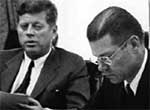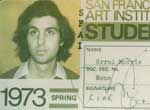By Ron Rosenbaum
New York Observer - September 29, 2003
Errol Morris seemed a little worried on his recent visit to New York, but I don't think he should be. He seemed a bit concerned about how people will perceive his new film about Robert McNamara, The Fog of War, which will have its New York premiere as the "centerpiece" film of the upcoming Film Festival at Lincoln Center.
It's Robert McNamara -- the former Secretary of Defense who presided over the disastrous escalation of the Vietnam War -- who should be worried, if you ask me. I know Errol and I sometimes differ about his films because I'm more judgmental, let's say, and he takes a more, well, generously complex approach to his subjects. So this is my take, not necessarily his, but I see The Fog of War as a devastating portrait of self-deception (Errol Morris' great theme). Nonetheless, as Errol put it in his conversation with Mark Singer at one of the New Yorker Festival events, "We see what we believe," and evidently Robert McNamara doesn't seem to be worried by what he sees of himself. He's already, I'm told, scheduled a showing of the film at the Kennedy Center at Harvard for what someone described as "the remains of Camelot."
But that makes sense: Even in his purportedly confessionalmode, Mr. McNamara is quick to absolve himself. Even when he appears to accuse himself of being a war criminal (for engineering the World War II firebombing of Tokyo, whichcaused 100,000 civilian casualties). Even in his damningsilence about his silence when he knew the war in Vietnam was a losing proposition (at the time, 25,000 Americanshadbeen killed -- but Mr. McNamara kept silent, and another 35,000 American soldiers, as well as hundreds of thousandsmoreVietnamese civilians, died as well). Despite this, Mr. McNamara's supreme self-confidence, his unassailable self-regard, seems unshaken. With every confession he makes in this film, he has a wonderful capacity to grant himself absolution almost simultaneously, just for having confessed. He is the High Priest of Self-Absolution.
Which is why I don't think Errol Morris has to worry: Nobody who watches this film with any sensitivity to this dynamic of self-deception and self-absolution will see it as a vindication of Mr. McNamara's conscience. Not when they factor in the shocking epilogue.
The one person who really has the most to worry about may be Donald Rumsfeld. Rummy has nothing -- explicitly -- to do with the film. But his resemblance to McNamara -- the impervious McNamara-like demeanor, the unshakable McNamara-like self-confidence, what Leon Wieseltier recently called Rummy's "clinical euphoria," even his McNamara-like hair -- will revive the question: Is Rummy McNamara 2.0? Will "postwar" Iraq be Vietnam 2.0?
The full title of the film is The Fog of War: Eleven Lessons from the Life of Robert S. McNamara, and it is one of the most complex, thought-provoking films I've seen in a long time -- and I think that's something I'd say even if I hadn't become a friend of the filmmaker (he wrote an introduction to my collection, The Secret Parts of Fortune). If I weren't a friend, I probably wouldn't have had the temerity to suggest to Errol that the film should be retitled -- albeit with a phrase I took from Errol's own words.
This was back in April, when he'd sent me a videocassette of the version of the film he was taking to Cannes, which was then subtitled "Eleven Lessons of Robert S. McNamara." After I'd watched it, I had suggested a somewhat different subtitle to Errol. Not a better subtitle necessarily but, to me, a more fully descriptive one: not "Eleven Lessons of Robert S. McNamara," but "Eleven Excuses of Robert S. McNamara." At which point, Errol came back with a typically brilliant -- and also typically funny -- meditation on the complex moral ambiguities to be found in the difference between explanation and excuse:
"I've always wondered where explanations end and excuses begin. And is there a difference between excuses and explanations ... is an excuse a bad or self-serving explanation? I don't know. Maybe Newton's Law is an excuse for why bodies just stay at rest or in motion unless acted on by some external force. I look at the McNamara story as the-fog-of-war-ate-my-homework excuse. After all, if war is so complex, then no one is responsible."
"The Fog of War Ate My Homework." Yes! Precisely. He's touching on a particularly difficult question: Is it true that "to understand all is to forgive all"? Toward the close of the film, summing up the various forms of havoc he's wreaked on cities, civilians and nations, Mr. McNamara says, "We all make mistakes. We know we make mistakes... There's a wonderful phrase, 'the fog of war.' What 'the fog of war' means is, war is so complex it's beyond the ability of the human mind to comprehend all the variables. Our judgment, our understanding are not adequate, and we kill people unnecessarily."
The Fog of War Ate His Homework. That's why I don't think Errol needs to be worrying about people "calling me a shill for McNamara," as he put it during a lunch after the New Yorker event. I think Mr. McNamara ought to be worrying that he comes across as "a shill for McNamara," despite his trademark crocodile tears.
At some point during the New Yorker conversation, someone -- I can't recall whether it was Mr. Morris or Mr. Singer -- called crocodile tears, deliberately or inadvertently, "alligator tears." I like the notion of "alligator tears." In this film, McNamara reinvents crocodile tears, you might say; he transcends the more obvious crocodile tears and gives us -- alligator tears. Alligator tears aren't insincere, not in the same way crocodile tears folklorically are. I'd define alligator tears as tears of equanimity, of self-righteousness posing as self-criticism: The fog of war ate my homework.
Errol Morris' most well-known film is The Thin Blue Line, which someone described as the only murder mystery to actually solve a real murder -- he got a wrongfully convicted man on Texas' death row released when he convinced the real killer to confess. But I think it could be said that all of Errol Morris' films are mysteries in one way or another. His first film, Gates of Heaven, ostensibly about dueling pet cemeteries, can be seen as a film about the mystery of love in its Lucretian disguises. His most difficult and arcane film, Vernon, Florida, could be said to be about the mysteries of epistemology, how can we know what we know, what's beneath the surface of things. A Brief History of Time -- about Stephen Hawking -- is about the mysteries of the universe itself. Fast, Cheap and Out of Control is about the mystery of obsession.
And Mr. Death, his 1999 film about Fred Leuchter, the electric-chair designer turned tool of Holocaust deniers, was about the mystery of Mr. Leuchter's motivation, the mystery of self-deception. Was Mr. Leuchter merely a technocrat, whose pseudo-science happened to serve the agenda of Holocaust deniers, but who harbored no anti-Semitic animus himself? Was he deceiving himself, or did he know exactly whose purposes his discredited tests (which purported to prove that cyanide wasn't used to kill inmates at Auschwitz) were serving?
In a limited way -- Mr. McNamara is much smarter -- there are similarities to the Leuchter film. The mystery in The Fog of War also revolves around the deceptions and self-deceptions of a technocrat who uses rationality as an evasion of morality. It's the mystery of what is really going on in Mr. McNamara's mind. Is it true, as it seems to me, that the surface self-condemnation he engages in covers a far deeper self-satisfaction?
Is the real key to Mr. McNamara a recurrent habit that Errol shrewdly captures in the film, his repeated "offhand" boasting -- of how brilliantly he did in tests in grade school, how high his grades were in college, how well he did on the intelligence tests they gave him in the Army and at the Ford Motor Company. Did Mr. McNamara regard this film, his self-exculpation, as just another test he thinks he's aced?
At lunch, Errol reminded me of something I'd said when he was describing to me Mr. McNamara's wavering about whether to cooperate on the film. Something about how, after each interview he gave, he felt he had to give one more to justify what he'd said in the last one. "It makes no sense to do it," Mr. McNamara said to Errol. "It's stupid. But I'll do it anyway." "Isn't that the way we got into Vietnam?" I'd asked. But up until the very end, Mr. McNamara seems to think he can ace this particular exam, although I came away with the impression that he was digging a far deeper hole for himself. The question is: Did he know this? Was he being deceptive, even self-deceptive, in the self-condemnation that becomes self-exculpation?
The mystery discloses itself in the little details, the subtle word usages Mr. McNamara employs. This is a film that repays close attention, because one is studying a master at work -- a master at either deception or self-deception. (It's sometimes hardtodecipher,_since_Mr. McNamara is so clever at it.)
For instance, he takes us through the mathematical calculations he did for Gen. Curtis LeMay, who was supervising the bombing of Japan in World War II -- calculations that led LeMay to change his tactics, in a way that resulted in the more terrifyingly efficient destruction of Japanese cities and civilians. It was civilian destruction so disproportionate, Mr. McNamara suggests, he and LeMay would have been indicted as war criminals had we lost the war. Then he interjects: "Now I don't want to suggest that it was my report that led to ... the firebombings." How would we ever get that idea?
At another point, he says that he and J.F.K. were about to pull out of Vietnam in the fall of 1963, but a coup there spoiled the plan. He then goes on to virtually admit what everyone knows: that the U.S. itself sponsored the coup.
And when he talks about the decision to use Agent Orange in Vietnam to defoliate the forest cover, supposedly making it easier to get at the foe from the air, he speaks of how it was only discovered after the war that many of our own soldiers suffered death and disabilities from Agent Orange poisoning. He speaks philosophically at first of how one can't always know the consequences of actions taken in wartime -- "The Fog of War Ate My Homework" again. And then, suddenly -- as if the phrase "liability suit" has crossed his mind -- he interjects, "I'm not really sure I authorized Agent Orange, I don't remember it, but it certainly occurred, the use of it occurred, while I was Secretary."
But for me, the great moment in the film is when Mr. McNamara's rationalization machine finally breaks down. It's in the epilogue, when Errol -- who rarely interrupts the stream of rationalization, instead allowing it to deconstruct itself -- asks the Big Question, the one about Mr. McNamara's silence.
Mr. McNamara has spent a goodly portion of the film's last half explaining how he came to the painful conclusion that the American effort in Vietnam was a futile waste of lives. How he told President Johnson this before he resigned (or was fired) in 1967. How he even naively embraced the propaganda of his onetime Vietnamese foes when they told him at a conference in the 90's that they were merely fighting for their independence, that the struggle had nothing to do with Marxism and the ColdWar. Something that would be nice to believe, but is belied by the release of documents from the Soviet archives, and the fact of the gulags for dissenters which the Vietnamese communist regime still maintains. (Let's face it: The war may have been stupidly conceived and executed by Mr. McNamara and his Camelot minions, but that doesn't make the North Vietnamese the harmless "agrarian reformers" many of us on the antiwar side wanted to believe they were. They turned out to be stone Stalinists.)
Does Mr. McNamara believe this propaganda, or is it his way of excusing the incompetent conduct of the war on our side: Nobody could have beaten them, because to Mr. McNamara's utter surprise -- the thought apparently never crossed his mind -- the North Vietnamese were fighting for their independence. So don't blame him for screwing it up at the cost of millions of lives.
But all of this is irrelevant, in a way, to that final silence. It comes in an epilogue in which you see Mr. McNamara driving a car. Almost all of it is in tight close-ups on his eyeglasses, or his eyeglasses in the car's rear-view mirror. The eyes themselves -- the "I" itself, you might say -- are conspicuously concealed.
As we watch this, we hear Errol in voiceover asking the questions that have been building in our minds (well, they certainly were building in mine). Mr. McNamara resigned or was fired in 1967 and went on to serve out the rest of the Vietnam War's duration in a posh sinecure as the World Bank's president. He'd told President Johnson that the war was futile but no one else, anyway not publicly -- at a time when his voice, as the architect of the war, might have foreshortened it and saved hundreds of thousands of American and Vietnamese lives.
"Why," Errol asks, "did you fail to speak out against the war after you left the Johnson administration?"
Here's the final deciding question on the Big Test. How will this genius of ratiocination, this master of self-exculpation, handle this one? It is incredibly suspenseful.
And then ... he punts. He just refuses to answer. "I'm not going to say anymore than I have," Mr. McNamara says. "These are the kinds of questions that get me in trouble. You don't know what I know about how inflammatory my words can appear."
No shit, Sherlock. It's not just your words that were inflammatory, it was your napalm. That's the point -- especially if you knew it was pointless and you didn't say anything and allowed the body bags to keep on coming.
And then Errol presses the point. He asks the question we all want him to ask: "Do you feel personally responsible for the war? Do you feel guilty?"
And this time ... he punts again. "I don't want to go any further on this question. It just opens up more controversy ... "
And then Errol, in his wonderful "I'm just curious" voice, asks: "Do you get the feeling that you're damned if you do [talk] and if you don't, no matter what?"
"Yeah, yeah, that's right," Mr. McNamara says. "And I'd rather be damned if I don't."
It's a deal.
New Morris Film Traps McNamara in a Fog of War
REVIEWS/ARTICLES
Todd McCarthy (Fog of War)
Fred Kaplan (Fog of War)
Samantha Power (Fog of War)
Kenneth Turan (Fog of War)
Peter Applebome (Mr. Death)
Ron Rosenbaum (Mr. Death)
Todd McCarthy (Fast, Cheap & Out of Control)
David Ansen (Fast, Cheap & Out of Control)
Roger Ebert (The Thin Blue Line)
Terrence Rafferty (The Thin Blue Line)
Janet Maslin (Vernon, Florida)
Alan Berger (Gates of Heaven)
Michael Covino (Gates of Heaven)
Roger Ebert (Gates of Heaven)
MORE FOG OF WAR
Official Film Website
Synopsis
Transcript
Watch Clip
Storyboards
Academy Awards Acceptance Speech
Fog of War Glossary
McNamara Gallery
B-29 Cluster Layout
'Fog of War' vs. 'Stop the Presses' (Argument)
Ounce Of Preventive War, Pound Of Destruction (Editorial)
BUY THIS MOVIE
Amazon
OTHER FILMS
Gates of Heaven
Vernon, Florida
The Thin Blue Line
A Brief History of Time
Fast, Cheap & Out of Control
Mr. Death
Standard Operating Procedure
Tabloid
The Unknown Known
The B-Side
Wormwood
American Dharma






